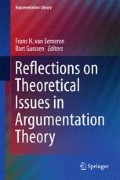Abstract
The main goal of this paper is to outline an agent-centered theory of argumentation. Our working hypothesis is that the aim of argumentation depends upon the agenda agents are disposed to close or advance. The novelty of this idea is that our theory, unlike the main accounts of argumentation (i.e., rhetorical, dialogical and epistemological theories of argumentation), does not establish an a priori function that agents are expected to achieve when arguing. Instead, we believe that the aims of argumentation depend upon the purposes agents are disposed to achieve (i.e., their agendas).
Access this chapter
Tax calculation will be finalised at checkout
Purchases are for personal use only
Notes
- 1.
There is a remarkable difference between Gabbay and Woods’s and Niño’s approaches. While in Gabbay and Woods’s proposal, the agenda is understood as the aim plus the plan for its realization, in Niño’s account, the agenda is just the objective, and it is distinguished from its conditions of resolution. As a consequence, while in the former, if something is not planned, it is not an agenda, in the latter, everything that appears as an aim for an agent, either deliberately planned or not, is recognized as an agenda.
- 2.
A previous version of these types of agendas was proposed in Niño (2013, pp. 233–236).
- 3.
Here we are paraphrasing one of the main concerns that Lumer had about our proposal at the ISSA conference in 2014. We strongly appreciate his insightful ideas.
References
Aliseda, A. (2006). Abductive reasoning. Logical investigations into discovery and explanation. Dordrecht: Springer.
Biro, J., & Siegel, H. (1992). Normativity, argumentation and an epistemic theory of fallacies. In F. van Eemeren, R. Grootendorst, J. Blair, & C. Willard (Eds.), Argumentation illuminated (pp. 85–103). Amsterdam: SicSat.
Blair, A. (2004). Arguments and its uses. Informal Logic, 24(2), 137–151.
Doury. M. (2012). Preaching to the converted. Why argue when everyone agrees? Argumentation, 26(1), 99–114.
Feldman, R. (1994). Good arguments. In: F. Schmitt (Ed.), Socializing epistemology. The social dimensions of knowledge (pp. 159–188). Lanham: Rowman & Littlefield.
Gabbay, D. & Woods, J. (2005). The reach of abduction: Insight and trial. A practical logic of cognitive systems (Vol. 2). Elsevier, Amsterdam.
Gabbay, D. & Woods, J. (2003). Agenda relevance: A study of formal pragmatics. A practical logic of cognitive systems (Vol. 1). Elsevier, Amsterdam.
Goldman, A. (1999). Knowledge in a social world. Oxford: Clarendon.
Hamblin, C. (1970). Fallacies. London: Methuen.
Johnson, R. (2000). Manifest rationality. A pragmatic theory of argument. Mahwah: Erlbaum.
Lakoff, G. (1987). Women, fire, and other dangerous things. Chicago: The University of Chicago Press.
Lumer, C. (1990). Praktische Argumentationstheorie. Theoretische Grundlagen, Praktische Begründung und Regeln Wichtiger Argumentionsarten. Braunscheweig: Viewe.
Lumer, C. (1991). Structure and function of argumentations. An epistemological approach to determining criteria for the validity and adequacy of argumentations. In F. van Eemeren, R. Grootendorst, A. Blair & C. Willard (Eds.), Proceedings of the Second International Conference on Argumentation. Organized by the International Society for the Study of Argumentation (ISSA) (pp. 98–107). Amsterdam: Sicsat.
Lumer, C. (2005). The epistemological theory of argument—how and why? Informal Logic, 25(3), 213–243.
Niño, D. (2013). Agentes y circunstancias. Consideraciones en torno a factores epistémicos y fiduciarios en la argumentación intercultural. In C. Martinez (Ed.), Cuatro aproximaciones al dialogo argumentativo intercultural (pp. 187–246). Bogotá, Universidad Jorge Tadeo Lozano.
Niño, D. (2015). Elementos de semiótica agentiva. Bogotá: Universidad Jorge Tadeo Lozano.
Peirce, C. S. (1903). The logic of abduction. In The Peirce Edition Project (Eds.) The essential Peirce (Vol. 2, pp. 226–241). Bloomington: Indiana University Press.
Perleman, C., & Olbrecht-Tyteca, L. (1969). The new rhetoric. A treatise on argumentation. Notre Dame: University of Notre Dame Press.
Short, T. (2007). Peirce’s theory of signs. Cambridge: Cambridge University Press.
Siegel, H., & Biro, J. (1997). Epistemic normativity, argumentation, and fallacies. Argumentation, 11, 277–292.
Voelkel, J. (2001). The composition of Kepler’s Astronomia nova. Princeton: Princeton University Press.
Tindale, C. (2004). Rhetorical argumentation. Principles of theory and practice. Thousand Oaks: SAGE Publications.
van Eemeren, F., & Grootendorst, R. (1984). Speech acts in argumentative discussions. Dordrecht: Foris Publications.
van Eemeren, F., & Grootendorst, R. (2004). A systematic theory of argumentation. The Pragma-Dialectical approach.. Cambridge: Cambridge University Press.
van Eemeren, F. (2010). Strategic maneuvering in argumentative discourse: Extending the Pragma-Dialectical theory of argumentation. Amsterdam: John Benjamins Publishing Company.
Woods, J. (2013). Errors of reasoning: Naturalizing the logic inference. Milton Keynes: College Publications.
Author information
Authors and Affiliations
Corresponding author
Editor information
Editors and Affiliations
Rights and permissions
Copyright information
© 2015 Springer International Publishing Switzerland
About this chapter
Cite this chapter
Niño, D., Marrero, D. (2015). The Agentive Approach to Argumentation: A Proposal. In: van Eemeren, F., Garssen, B. (eds) Reflections on Theoretical Issues in Argumentation Theory. Argumentation Library, vol 28. Springer, Cham. https://doi.org/10.1007/978-3-319-21103-9_4
Download citation
DOI: https://doi.org/10.1007/978-3-319-21103-9_4
Published:
Publisher Name: Springer, Cham
Print ISBN: 978-3-319-21102-2
Online ISBN: 978-3-319-21103-9
eBook Packages: Humanities, Social Sciences and LawPhilosophy and Religion (R0)

